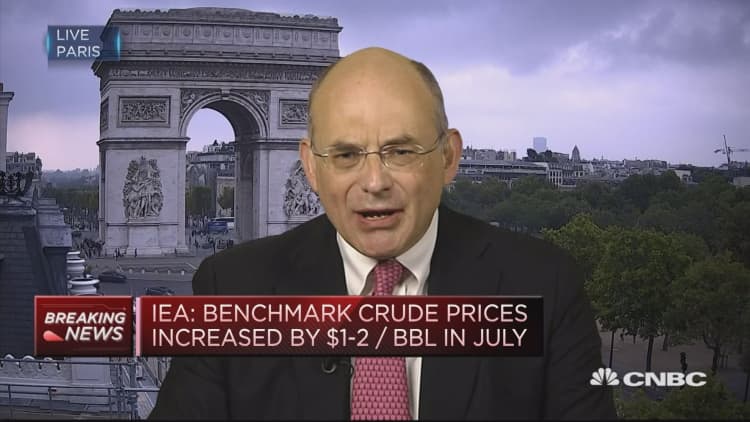Oil prices tumbled more than 2 percent on Monday in volatile trade, as the dollar strengthened and China posted weak domestic demand data, sinking prices that had gotten a short-lived boost on concerns about potential reductions in crude supply from Libya.
U.S. West Texas Intermediate (WTI) crude futures ended Monday's session down $1.23, or 2.5 percent, at a three-week low of $47.59 a barrel. Global benchmark Brent crude futures were down $1.36, or 2.6 percent, at $50.74 a barrel by 2:29 p.m. ET (1829 GMT).
Trade was volatile, with prices falling early on the Chinese demand data, then retracing losses after Libya's national oil corporation said it was investigating security violations at the country's largest oil field.
Chinese refineries processed 10.71 million barrels per day (bpd) in July, National Bureau of Statistics (NBS) data showed, down around 500,000 bpd from June and the lowest rate since September 2016.
Analysts said the drop was steeper than expected, exacerbating concerns that a glut of refined fuel products could weaken Chinese demand for oil.

The dollar rose broadly as traders unwound bearish bets against the U.S. currency that have come in the wake of increasing tensions with North Korea and underwhelming inflation data.
The absence of further abrasive rhetoric by U.S. President Donald Trump and North Korean leader Kim Jong Un over the weekend helped bring investors back to the dollar, analysts said.
Libya's National Oil Corporation (NOC) said an investigation had been opened into recent security violations at Sharara oil field. The NOC did not specify whether the violations had affected output at the country's largest field, which has been producing about 270,000 barrels a day.
Workers at Libya's Zueitina export terminal threatened to block a tanker due to dock on Saturday unless demands for salary and overtime payments are met.
"It is back to the Libyan situation being the most important thing here," said Bob Yawger, director of energy futures at Mizuho in New York. "You have Libyan barrels off the market, so supply is not what it was at this time last week."
Efforts by the Organization of the Petroleum Exporting Countries and other oil producers to limit output have helped prop up prices above $50 a barrel.
Breaching this threshold has meant more money managers are betting on further gains in Brent, with the latest ICE exchange data showing investors last week raised net long holdings of the commodity by the highest amount this year.

This contrasts with more bearish bets placed in the U.S. market, where investors cut net long U.S. crude positions last week, according to the U.S. Commodity Futures Trading Commission.
Oversupply has been exacerbated by rising production in Libya, which is one of the OPEC members exempt from production cuts and has been trying to regain its pre-war oil production levels.
"The recovery in Libyan production has been the single largest factor driving global supply growth in the last few months," said oil analysts at Panmure Gordon.
Oil investors were also cautious after U.S. drilling rig data published by Baker Hughes on Friday showed explorers increased oil drilling capacity for the second time in three weeks, extending a 15-month recovery in drilling.
The rising rig count hints at sustained output growth just as the world's major oil producers, excluding the United States, try to stem oversupply by trimming production.
— CNBC's Tom DiChristopher contributed to this story.

